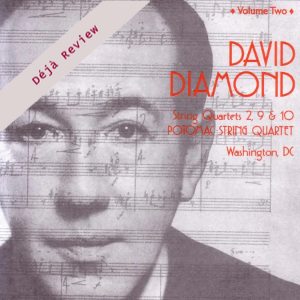
Déjà Review: this review was first published in February 2003 and the recording is still available.
David Diamond (1915-2005)
The String Quartets – Volume 2
String Quartet No. 2 (1943-44)
String Quartet No. 9 (1965-68)
String Quartet No. 10 (1966)
Potomac String Quartet
rec. 2001, St Luke’s Church, McLean, USA
Albany TROY540 [54]
In the Scandinavian states Nordic composers have benefited from thorough recording programmes – often state-aided. Perhaps they have not been as comprehensive or as frequent as first impressions might suggest but at heart their recording industries seem motivated by an admirably idealistic momentum and financial commitment that have produced projects many of us in the rest of the world have looked on with envy. Taking but two examples: the Rosenberg quartets have been recorded complete by Caprice and the Holmboes by Dacapo. Albany are now moving in the same direction for Diamond but these have been financed by the Copland Fund. The mission has been that of Steven Honigberg.
This disc is the second instalment in a four part set in which the Washington DC-based Potomac Quartet are to record all the string quartets by David Diamond. The first volume has already been reviewed here.
Diamond’s Second Quartet was premiered in Buffalo in 1961 by the Kroll Quartet. It is a work of sustained, streaming and long-breathed lines. The vigorous rhythmic life which could easily have been Stravinskian, given the vintage, is in fact very close to Tippett. Here the quartet is played with every ounce of the considerable energy and concentration at the Potomac’s bidding. You need to think in terms of the sometimes torrential, sometimes contemplative keening and singing of Tippett’s Concerto for Double String Orchestra and the Corelli Fantasia but without the dissonance of the latter. It is dedicated to Edward Stringham, an early and sympathetically supportive friend on the staff of ‘The New Yorker’.
Then come two much later quartets from the mid-1960s each being a minute or so over a quarter of an hour’s duration. The single movement Ninth is dedicated to Roger Sessions ‘for his 70th birthday’. A virile Bergian continuum this piece ultimately sinks reflectively back into the silence from which it emerged rather than raving to a belligerent or heroic close. The three movement Tenth was written for the Lywen Quartet (named after Werner Lywen, leader of Bernstein’s City Center Orchestra). It is Diamond’s last quartet. These two late quartets are now less Tippett and more Frankel although in the poised calm of parts of the Lento of the Tenth Diamond reaches back to the tonal cradling from which his music first emerged.
The booklet notes take the same relaxed conversational form followed in volume one. The composer and the skilled interviewer Alex Jeschke discuss the music. The notes and conversations are printed in English only.
The Aaron Copland Fund for Music supported this series financially. Their benevolence has been amply rewarded. Perhaps they might now consider a cycle of Diamond symphonies, the much needed reissue of Schuman’s Viola Concerto on Old English Rounds (originally on CBS) or better still the first digital outing for Howard Hanson’s opera Merry Mount.
We also need complete cycles of the string quartets by William Schuman. I hope that the Potomac will move to this project when they have completed the Diamond sequence.
I am grateful once again to Steve Honigberg, the cellist of the Potomac for sending me a review copy of the present disc.
The scorchingly committed performances and recording of these monuments of twentieth century music-making are well up to the exalted standards set by volume one.
Rob Barnett
Help us financially by purchasing from



















